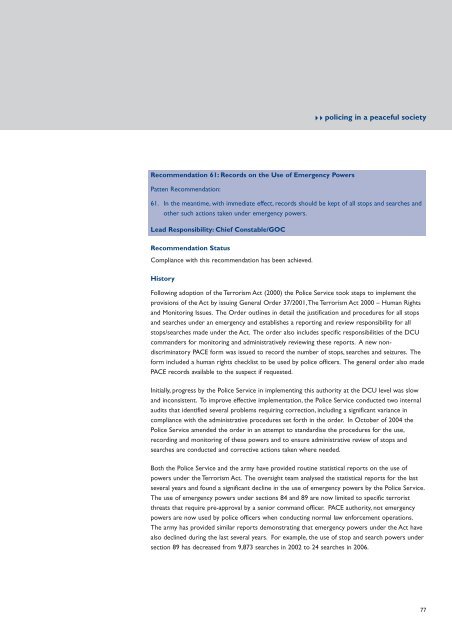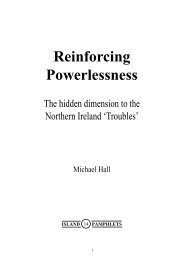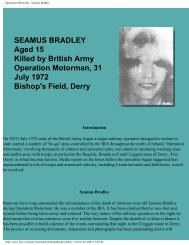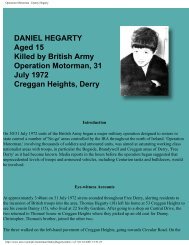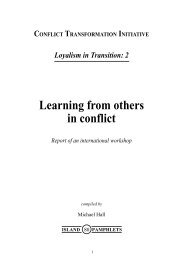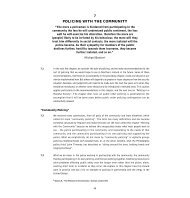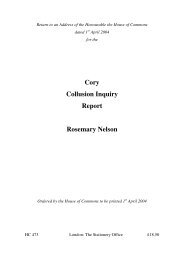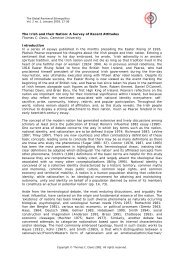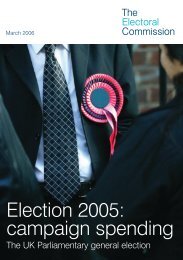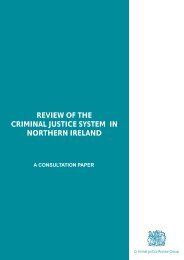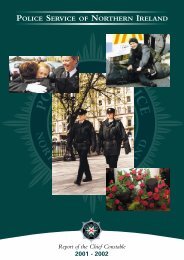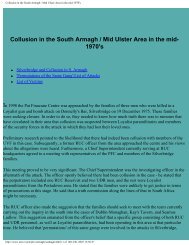11293 report 19 - CAIN - University of Ulster
11293 report 19 - CAIN - University of Ulster
11293 report 19 - CAIN - University of Ulster
Create successful ePaper yourself
Turn your PDF publications into a flip-book with our unique Google optimized e-Paper software.
policing in a peaceful societyRecommendation 61: Records on the Use <strong>of</strong> Emergency PowersPatten Recommendation:61. In the meantime, with immediate effect, records should be kept <strong>of</strong> all stops and searches andother such actions taken under emergency powers.Lead Responsibility: Chief Constable/GOCRecommendation StatusCompliance with this recommendation has been achieved.HistoryFollowing adoption <strong>of</strong> the Terrorism Act (2000) the Police Service took steps to implement theprovisions <strong>of</strong> the Act by issuing General Order 37/2001,The Terrorism Act 2000 – Human Rightsand Monitoring Issues. The Order outlines in detail the justification and procedures for all stopsand searches under an emergency and establishes a <strong>report</strong>ing and review responsibility for allstops/searches made under the Act. The order also includes specific responsibilities <strong>of</strong> the DCUcommanders for monitoring and administratively reviewing these <strong>report</strong>s. A new nondiscriminatoryPACE form was issued to record the number <strong>of</strong> stops, searches and seizures. Theform included a human rights checklist to be used by police <strong>of</strong>ficers. The general order also madePACE records available to the suspect if requested.Initially, progress by the Police Service in implementing this authority at the DCU level was slowand inconsistent. To improve effective implementation, the Police Service conducted two internalaudits that identified several problems requiring correction, including a significant variance incompliance with the administrative procedures set forth in the order. In October <strong>of</strong> 2004 thePolice Service amended the order in an attempt to standardise the procedures for the use,recording and monitoring <strong>of</strong> these powers and to ensure administrative review <strong>of</strong> stops andsearches are conducted and corrective actions taken where needed.Both the Police Service and the army have provided routine statistical <strong>report</strong>s on the use <strong>of</strong>powers under the Terrorism Act. The oversight team analysed the statistical <strong>report</strong>s for the lastseveral years and found a significant decline in the use <strong>of</strong> emergency powers by the Police Service.The use <strong>of</strong> emergency powers under sections 84 and 89 are now limited to specific terroristthreats that require pre-approval by a senior command <strong>of</strong>ficer. PACE authority, not emergencypowers are now used by police <strong>of</strong>ficers when conducting normal law enforcement operations.The army has provided similar <strong>report</strong>s demonstrating that emergency powers under the Act havealso declined during the last several years. For example, the use <strong>of</strong> stop and search powers undersection 89 has decreased from 9,873 searches in 2002 to 24 searches in 2006.77


